-
12 July 1536 – Death of Desiderius Erasmus, known as Erasmus of Rotterdam, or simply Erasmus, was a Dutch Renaissance humanist, Catholic priest, social critic, teacher, and theologian.
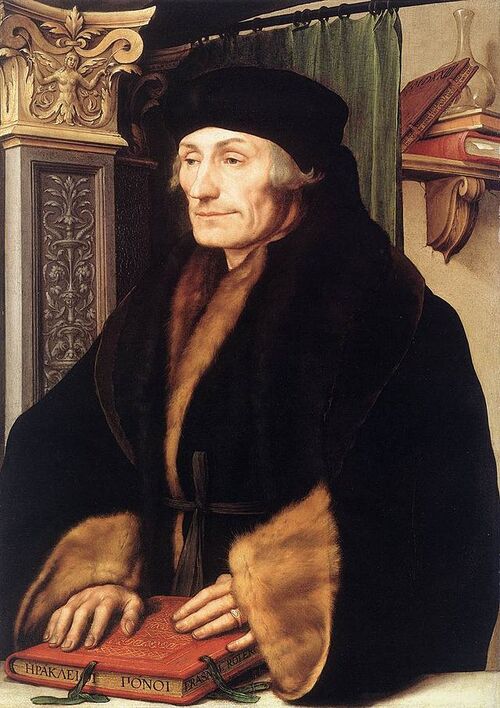
1537 - Execution of Robert Aske.He was an English lawyer who became the leader of rebellion in York. He led the Pilgrimage of Grace in 1536 and was executed for treason

1543 - Marriage of Henry VIII and Catherine Parr

The King's Marriage.
Notarial instrument witnessing that, on 12 July 1543 Hen. VIII., in an upper oratory called "the Quynes Pryevey closet" within the honor of Hampton Court, Westm. dioc., in presence of the noble and gentle persons named at the foot of this instrument and of me, Ric. Watkins, the King's prothonotary, the King and lady Katharine Latymer alias Parr being met there for the purpose of solemnising matrimony between them, Stephen bp. of Winchester proclaimed in English (speech given in Latin) that they were met to join in marriage the said King and Lady Katharine, and if anyone knew any impediment thereto he should declare it. The licence for the marriage without publication of banns, sealed by Thos. abp. of Canterbury and dated 10 July 1543, being then brought in, and none opposing but all applauding the marriage, the said bp. of Winchester put the questions (recited) to which the King, hilari vultu, replied "Yea" and the lady Katharine also replied that it was her wish; and then the King taking her right hand, repeated after the Bishop the words, "I, Henry, take thee, Katharine, to my wedded wife, to have and to hold from this day forward, for better for worse, for richer for poorer, in sickness and in health, till death us depart, and thereto I plight thee my troth." Then, releasing and again clasping hands, the lady Katharine likewise said "I, Katharine, take thee Henry to my wedded husband, to have and to hold from this day forward, for better for worse, for richer for poorer, in sickness and in health, to be bonayr and buxome in bed and at board, till death us depart, and thereto I plight unto thee my troth." The putting on of the wedding ring and proffer of gold and silver (described) followed; and the Bishop, after prayer, pronounced a benediction. The King then commanded the prothonotary to make a public instrument of the premises. Present : John lord Russell, K.G., keeper of the Privy Seal, Sir Ant. Browne, K.G., captain of the King's pensioners, and Thos. Henage, Edw. Seymer, Hen. Knyvet, Ric. Long, Thos. Darcy, Edw. Beynton, and Thos. Speke, knights, and Ant. Denny and Wm. Herbert, esquires, also the ladies Mary and Elizabeth the King's children, Margaret Douglas his niece, Katharine duchess of Suffolk, Anne countess of Hertford, and Joan lady Dudley, and Anne Herbert.
Notarial attestation by Ric. Watkins, Ll. B., King's prothonotary.
source:http://www.british-history.ac.uk/
-

11 July 1274 – Birth of Robert the Bruce, Scottish king
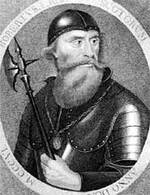
1476 – Giuliano della Rovere is appointed bishop of Coutances.
1531 - Henry moved the court to Woodstock for a spell of hunting. He did not tell Catherine of Aragon about the move, choosing, instead, to leave her and Princess Mary alone in the deserted apartments at Windsor. On finding her husband gone, Catherine wrote to Henry expressing her regret that she hadn't been up to say goodbye to him when he left to go hunting

1533 - Pope Clement VII ordered Henry VIII to abandon Anne Boleyn and drew up a papal bull excommunicating Henry VIII.

The Pope's Sentence:
Sentence of Clement VII. against Henry VIII., declaring his divorce from Katharine and marriage with Anne Boleyn null ; and pronouncing the King to have incurred the greater excommunication, but suspending the declaration of the same till the end of September.
Chapuys to Charles V.
As the King, I suppose, considers that it would only be a waste of time and trouble to try and get me to consent expressly or tacitly to the matters he had proposed to me by his Council, nothing more has been said to me of them, although it had been appointed between the Council and me that they would let me know the King's pleasure. Instead of this, five days after I was with them, the King gave instructions to the chamberlain, almoner, master of the Horse, and secretary of the Queen, and to the purveyor of her house, to make divers remonstrances to her, especially that it came of great arrogance and vainglory on her part to usurp the title of Queen, seeing that she could not pretend ignorance that he had been lawfully divorced from her by the opinions of the chief universities of Christendom, and duly married to another, who had been since crowned ; that she deceived herself in supposing that he would ever in his life take her back as his wife, but that if she would content herself in submitting to things done, and obey his will, he would treat her well,—otherwise he would publish through the kingdom the effort he had made to treat her well, and the obstinacy of her refusal, after which he would punish her as his subject ; and that if she persevered in this obstinacy, she would create parties in the kingdom, and confusion in the succession, from which would arise enormous bloodshed and great destruction of the kingdom, to the burden of her conscience. Moreover, that if she persisted the King would ill-treat the Princess ; and those who spoke of it, and all her other servants, would incur the King's indignation. To all these dreadful temptations or adjurations the Queen replied openly and courageously, that as she knew assuredly she was the King's true wife, she would never call herself otherwise than Queen, or answer to any other name, to any person in the world ; and that this course must not be attributed to arrogance or vainglory, for she would be much more proud to be called the daughter of her father and mother than to be the greatest queen in the world, if she could not conscientiously use the title. As to the unjust sentence of the archbishop of Canterbury, the intrigues to purchase the opinions of the universities, the form of this clandestine and accursed marriage, she declared the whole mystery at full length. As to the King not taking her back, she had perfect confidence that He who in a moment converted St. Paul, and turned him from a persecutor into a preacher, would inspire the King's conscience, and not permit such a virtuous prince long to continue in error, to the slander of Christendom and ecclesiastical authority. As to the division of the kingdom, and the confusion of the succession, those only were to blame who had persuaded this new marriage, because the King had already lawful succession acknowledged by the whole kingdom ; and from such an abominable marriage there could only arise a perverse offspring, which would throw all into confusion that allowed it to reign. As to the publication of which they spoke, she would very much desire that not only all the kingdom but all the world knew that she would not consent to things so unjust, or to be treated otherwise than as Queen.
As to the punishment with which they threatened her, if she had offended the King, he might punish her as his wife, but not otherwise, except wilfully and by force ; for unless she was his wife, all the world knew what submission he could claim from her. As to the Princess, the King being her father could do what he pleased. No doubt she would be sorry to see her ill-treated, and also that her servants should incur the King's indignation ; but neither for that, nor for any death, would she damn her soul or that of the King her husband.
When the King understood that the Queen would not submit to his demand, without waiting for the full report, he caused to be printed and published through the city, by sound of trumpets, the edict of which I send a copy translated to your Majesty. He has since caused to come hither the persons named in the above instruction, to redeliver to them, as they think, a charge upon the said commission, or else to suborn them from the service of the Queen. Till now nothing has been said to them, except that Cromwell has thanked them on the King's behalf for the good service they have done in their charge, and desired them to wait awhile for the determination of the order to be taken in the Queen's matters ; and even Cromwell was unable to refrain from saying to them that it was impossible to make a more virtuous and prudent answer than the Queen had done, and that God and nature had done her great injury that she had no male issue, for she had surpassed in glory and reputation nearly all the princes one reads of. God grant that the treatment they give her may correspond to these praises and her merits.
A courier arrived from Rome eight days ago, bringing news, as I understand, that the King's excusator at Rome had been forbidden to interfere in the process ; on which news the King had despatched two couriers in two days. It is said they carry the originals of the determinations of the universities, the sentence of the archbishop of Canterbury, and an appeal to the Council against the exclusion of the excusator, hoping by this means to hinder the effect of the sentence.
I understand the Lady complains daily of the Easterlings, who on the day of her entry had set the Imperial eagle predominant over the King's arms and hers ; and also that through the villages where the Princess passed the other day they made her great festivity, which is as if God had descended from Heaven. The Lady is very much displeased, and would like much to punish the people. This may serve as an indication of her perverse and malicious nature.
The truce is not yet settled with the Scots, for all the English have reported. The Scots made a raid on the 13th ult. a long way into this kingdom, and, besides other robberies, burnt two villages.
The Pope has written to the Nuncio that since things were getting so bad here, and he had so great a desire to withdraw, he might take leave of the King under pretence of visiting his Holiness at Nice, or some other excuse. This he has done, and has received great presents ; the King being very glad that he is to be at the said meeting, for the great confidence the English have in him, as I lately wrote.
The King, at the request of an Irish lord named ... who has some dispute with his neighbours, is sending him artillery and ammunition.
Eight months ago, as I wrote, he had a great notion of casting a quantity of artillery of every kind ; and for this great preparation was made, both in getting supplies of metal and making moulds, but only one piece has been cast, and nothing more has been said of it, as the founders themselves have informed me.
This very instant I have received your letters of the 19th ult. with the documents therein mentioned, of which I shall immediately inform the Queen. They will be a great consolation to her. London, 11 July 1533.
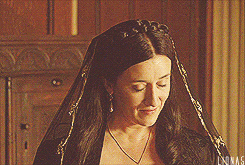
Katharine Of Arragon.
"Relacion de lo que ha pasado sobre la causa de la Serenisima Reyna de Ynglaterra."
When the Pope returned from Bologna, the English labored for the revocation of the two briefs against the King, and the Emperor's agents opposed it. The Pope committed the matter to cardinals Monte and Campeggio, to Simoneta and Paul de Capisuchis, auditors of the Rota, and to the Datary, who decided against the English. At this time the count of Cifuentes arrived at the Court. In a few days news came that the king of England had married Ana, and it was determined to let him know that he had incurred the censures and penalties mentioned in the briefs. On the other side, five remissorias were presented for the principal matter, but no more, on account of the nearness of the vacation. At the arrival of Rodrigo d'Avalos, the Count and he gave the Pope the Emperor's letter, and in consequence of their representations he ordered Paul de Capisuchis to report (refiriese) the cause in Consistory. This he did in three Consistories. His Holiness also ordered the Rota to examine everything. All the cardinals and auditors of the Rota were informed, as many doubts were urged by the English, and some of the cardinals were French, and inclined to England. Finally, the Consistory decided in favor of the Queen, and that the prohibition in this case was not de jure divino.
At this juncture, when a sentence for the Queen was inevitable, two days before the last Consistory, the English alleged that the King had examined witnesses when the case was before the Legates, who had not been produced at Rome, and that the Pope could not determine the case without seeing the whole process. To this it was replied that the Queen had sent the whole process up to the time she appealed, and no further proceedings could be received. The Queen not only appealed, but committed the cause anew against the King, per viam querelœ super molestationibus et matrimonio, by virtue of which the King was cited afresh, and the cause was instructa, so that what is said about having more process does not hinder the expedition. Even supposing that those witnesses were examined, which is not certain, except that the Pope says Campeggio told him that witnesses were examined, it was said that they could not prove anything to impeach the lawfulness of the Queen's marriage.
Supposing that the prohibition of marriage with a brother's widow is not de jure divino, it is clear that although witnesses might prove that the marriage with Arthur was consummated ; that Henry was a minor when the dispensation was obtained, and protested on arriving at puberty that he would not marry Katharine, and that he did not consider the dispensation valid ; and that there were no wars nor fear of wars ; all this is not to the point, as the dispensation was granted by Julius "pro pace conservanda," and this cause was true. It cannot be denied that the second marriage cemented the peace and alliance. The remisorias already proved show sufficient cause for a dispensation, even if the marriage was prohibited by divine law, which it is not. If it cannot be proved that Katharine was a virgin when she married the King, it cannot be denied that it is doubtful ; and the present marriage being public, notorious, and consummated, cannot be dissolved on account of the former, of which the consummation cannot be proved.
Even if the prohibition was de jure divino, the dispensation was good. The King has acted on it for many years, and deprived himself of the right of protestation against it. For these and many other reasons, the Pope may very well decide the case with satisfaction to his honor and conscience.
But it is thought the Pope and Cardinals have wished to desist (sobreser) in the expedition of the principal cause, as they clearly showed before this doubt about the process was urged. Seeing this deliberation, another way (verso) was taken to revoke ex officio pastorali all that the king of England had done to the prejudice of the Queen.
On the 11th of this July, the Pope in Consistory pronounced a sentence restoring the Queen to her royal state, annulling the King's marriage with Ana, whose children are declared illegitimate, and declaring that the King is excommunicate, and has incurred the penalties contained in the briefs.
The Queen's agents, seeing that the principal cause was not despatched in the last Consistory, presented the other remisorias, that matters might be arranged during the vacation, and the expedition insisted on at the next audiences. It is thought it will be shortly obtained.
A term was assigned to the King, until 1 Oct., for him to present any processes or writings of which he intends to make use.
1535-Chapuys to Charles V.
Having received three days ago letters from the king of the Romans, in which no mention was made of the detention of prothonotary Casale, I sent to tell Cromwell that what he had notified to me must either be a fiction or a thing done without the said King's knowledge. Cromwell replied that whether the said Prothonotary was detained or not, in consequence of what I had said he attached no importance to it, and even if the said King had hanged him he would not care a button; and it would be a good thing for the King his master, who would save the money which he was spending uselessly in the maintenance of the said Prothonotary. After saying this Cromwell made long representations to my messenger of the great advantage that would come of perfect friendship between your Majesty and the King his master, and urged him to exhort me to promote it in every possible way. I know not if these English are temporising, awaiting the success of your Majesty's army. I think also they have some hope of gaining the French to their minds, although they do not make any great show of attempting it, seeing the cool reception they gave to the bishop of Therbes when he was at Court the other day. The Bishop expected to remain at Bridewell, where the French ambassadors have resided for five years, but he was respectfully informed that he must remove. Cromwell had twice appointed an hour to the said Bishop and Morette, but when the hour came he was not at home; which is sufficient indication that affairs do not go smoothly between them. Moreover, Morette told the grand prior of St. John's, when he came to take leave of him, that, considering the time it cost, he had better not visit the said Bishop, or have great communication with him. The King, I am told, will despatch, a few days hence, his Treasurer [and] Controller to examine and fortify Calais and Guisnes for fear of the French; yet the King does not seem to be very much afraid either of Frenchmen or others, for he is more given to matters of dancing and of ladies than he ever was. Some say the said two persons will pass into France; nevertheless, I believe "que lung et lautre voage seront a limpur(?)." There will leave within two days a doctor and a gentleman whom this King has dispatched to Lubeck. Some tell me it is for the purpose of settling the disputes of the said city. I suspect it is an intrigue to prevent the Count Palatine aspiring to the kingdom of Denmark.
The good old lord of whom I have written sent to me the other day his cousin, when he was about to go home, and begged me, for his own part and that of many others, to solicit of your Majesty to obtain executorials, and cause them to be executed in your Majesty's countries. Even if no other means were taken, he thought this would do good, provided the said executorials were not delayed, otherwise the new preachers and prelates will subvert the whole people. He says, moreover, that churchmen will make a beginning, and, meanwhile, they might find means to get hold of the great treasure the King keeps at his house in this town. London, 11 July 1535.
1536- Dr. Ortiz to the Empress Isabella.
Wrote last 26 June with the news his Holiness had from England. The ambassador now writes 10 June that the Princess is well and anxious to be reconciled to her father; that the parliament began on the 7th, and was inclined to treat the daughter of Anne Boleyn as illegitimate. The day after Anne Boleyn's execution, the King married a lady of hers named Juana Semey at her house, and three days after took her to his palace; from whence in other three days, he published that he was married to her, and ordered festivities. The ambassador writes that she was a maid of the late Queen, and afterwards of Anne Boleyn; that she is virtuous and kindly and welldisposed to the Princess, in whose favor she has spoken to the King, and that there were hopes of her being declared true heir in the parliament. The Pope hears through France that Francis is endeavouring to marry the Dauphin with the Princess. The king of Scotland has also married with a lady of his kingdom. The cardinal of Sancta Cruz, though despatched; by his Holiness and the Consistory, has not yet left to go to the king of the Romans, awaiting an answer from his Highness. Hopes the Emperor's successes will not meet with any reverse. Rome, 11 July 1536.

1540-Anne of Cleves to Henry VIII.
Was told by divers of the Council of the doubts concerning their marriage, and how petition was made that the same might be examined by the clergy. Consented to this. Though the case must needs be hard and sorrowful, for the great love she bears to his most noble person; yet, having more regard to God and his truth than to any worldly affection, she accepts the judgment. Asks the King to take her as one of his most humble servants, and so to determine of her as she may sometimes have the fruition of his presence. The Lords and others of his Council now with her have put her in comfort thereof, and that the King will take her as his sister. Richmond, 11 July 32 Hen. VII Subscribed: “Your Majesty's most humble sister and servant Anne dochtter the Cleyffys.”
Headed by Wriothesley: Copy of the Lady Anne's first letter to the King's highness
source:http://www.british-history.ac.uk/,http://www.historyonthenet.com/
-
9 July 1540 – Henry VIII’s marriage to Anne of Cleves was declared null and void.

1551 - English currency is further debased
1553 - Bishop Ridley announced at the pulpit that Mary and Elizabeth were bastards,Mary wrote to the privy council stating her claim to the throne and demanding their allegiance.
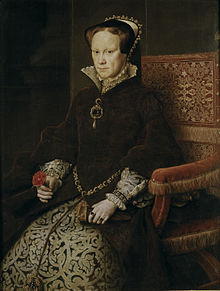
1577-Birth of Thomas West, 3rd Baron De La Warr, English politician
1578 –Birth of Ferdinand II, Holy Roman Emperor
10 July 1527-Thomas More travels with Cardinal Wolsey to France to ratify the new treaty with the French king.
1553 - Jane Grey declared queen of England
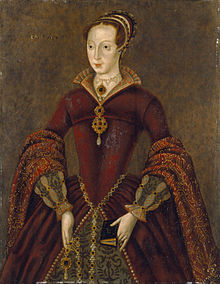
1559 - Henry II died from a jousting accident; Francis II and Mary, Queen of Scots become King and Queen of France

The Queen Elizabeth I to the French King.
True friendship makes all occurrences common among friends, as she feels at the present time. Since the amity lately concluded, she has taken much interest in the matter of his "triumphs," so now she experiences great sorrow on hearing of his wound. She praises God that the danger is so trifling. Anxious to have fuller intelligence she sends the present bearer, Charles Haward, with her most affectionate recommendations, for whom she asks credence.—Greenwich, 10 July 1559
1584 - Execution of Francis Throckmorton, he was a conspirator against Queen Elizabeth I of England in the Throckmorton Plot. He was the son of Sir John Throckmorton, the seventh out of eight sons of Sir George Throckmorton of Coughton Court. He was a nephew of Sir Nicholas Throckmorton, one of Elizabeth's diplomats, who had held the post of Chief Justice of Chester but was removed in 1579, a year before his death. His paternal grandmother, Hon. Katherine Vaux, daughter of Nicholas Vaux, 1st Baron Vaux of Harrowden, was the paternal aunt of Catherine Parr.
-
08 July 1528 – Birth of Emmanuel Philibert, Duke of Savoy
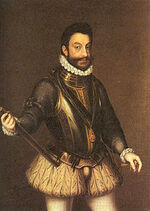
1545 – Birth of Carlos, Prince of Asturias.He was the eldest son and heir-apparent of King Philip II of Spain and Maria Manuela of Portugal
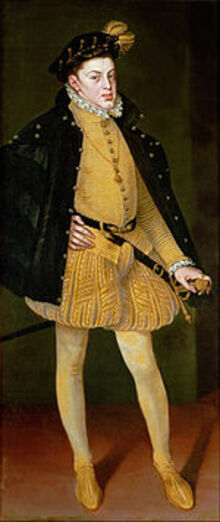
1553 - Mary Tudor declared herself Queen of England
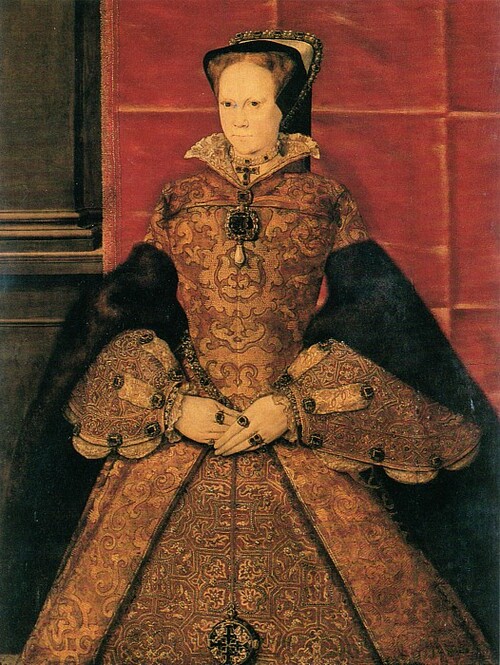
-
7 July 1207 –Birth of Elizabeth of Hungary
1307 – Death of Edward I of England
1456 – A retrial verdict acquits Joan of Arc of heresy 25 years after her death.
1528 –Birth of Archduchess Anna of Austria
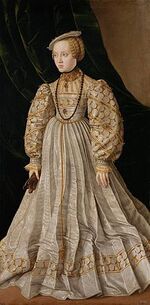
1534-Chapuys to Charles V.
Since the date of your letters of the 12th ult., which I received two days ago, your majesty will have seen by several of mine what was said here of the motions of Germany and the determination come to about the interview, which had been appointed for the middle of August, but has since been put off till Sept. 1 ; and some were lately thinking it would all be broken off, because, as the earl (lord) of Montague has sent to me to say, the king of France has sent word that they must not think when they met of treating anything against the faith, the Pope or the Holy See, because he wished to live a Catholic like his predecessors. This king is getting plate of all sorts manufactured, and all the goldsmiths are fully occupied. A man who has seen a bill of the quantity and the names of those to whom it is to be presented in France (de par dela) says that it will amount to 12,000 marks, I know not whether he means English marks of the value of two nobles each or marks of 8 oz. I believe, besides the said plate, the King will give away some of what he has already made, especially gold cups. The Queen fears that the little plate she has will go this time with her rings and jewels. As to the marriage of the king of Scotland with a daughter of the king of France, this king, as I have before written, has several times assured the Scotch ambassadors that there was an express treaty against it between him and the king of France, so that it is not to be supposed that he will consent to it. He has more suspicion of the French than he had when the said treaty was concluded, which was a little before he went last to France; and especially seeing the alliance the French king has lately made with the Pope, together with the fact that Francis has got nothing from his Holiness in favor of Henry, the making of this marriage would lead to a complete rupture. It is certain the French give the Scotch king some hope of it, to prevent the Scotch king making an alliance with your majesty. It is probable they would prefer it to be so, as they do not know a more convenient match for the youngest daughter. The Scotch ambassador declared to me that they had proposed to them that of Albret, and that it was a ruse to alienate the King his master still further from your majesty on account of the quarrel of Navarre; and that he thought his master would not on any account listen to it. The only danger would be if the Scotch king went to this meeting, as desired by those here and the French also, but I see no appearance of it as yet. I opposed it as much as possible to the ambassador. The person sent by your majesty to the king of Scots will do the rest. I am told by a Spanish sailor that he has arrived.
It is some time since the news arrived that your troops had left Coron. Various things have been said about it, to which I have replied that your majesty undertook to keep it, hoping that other princes would use it as a means of attacking the Turk; but seeing that they did not care, but some of them rather complained that your holding it would provoke the Turk to attempt something against Christendom, you had abandoned it. This language about irritating the Turk has been used to me by those here and by the ambassador of France.
On St. John's Day the ambassadors of Lubeck and Hamburg were with the King at Hampton Court, where they were very well received. On Sunday following they returned thither, and the doctor brought by those of Lubeck, who is the chief of the embassy, made a long Latin oration which lasted nearly two hours. Among other things he reviled horribly the authority of the Pope, and praised inestimably this king for many things, especially for his great learning and enlightenment from God, by which he had come to a knowledge of the truth both as to the authority of the Pope and about his marriage, and that he ought not to leave unavenged the great injury the Pope had done him in that matter. He magnified the power of Lubeck, declaring it was free, and could make alliances without regard to anyone. There is no doubt that when the King requested the Lubeckers to send hither ambassadors, he also furnished them with the matter of this oration. This doctor has played his part so well that the King has presented him with a great reward to remain here in his service, which perhaps he will accept.
He is a native of High Germany, though he lives at Lubeck. The ambassadors were also to have brought another doctor, whose learning and persuasive power they extol above Melanchthon's, but on his departure he fell ill. But being recovered, the ambassadors, I understand, have promised to bring him over to convert those who impugu the last marriage, and who make a difficulty about entering the Lutheran sect. They take it upon them that the said doctor will speak to no one but he will convert him to his opinion. It is not known that the said ambassadors have yet treated of any affairs with those here, and doubtless they will treat nothing against your majesty directly, but indirectly they will make some agreement to defend this king against the Pope and all others who might make war upon him on account of religion, or for execution of the sentence in favor of the Queen.
Although the earl of Kildare is so ill, both in brain and body, that he can do nothing either good or evil, he was apprehended eight days ago and taken prisoner to the Tower, where I am told he would have been put long ago as soon as he arrived here, had it not been that the King always hoped to bring over and entrap his son, a young man of bold and valiant spirit, who has great influence in Ireland; but he has not only refused to come, but has even mustered men and seized artillery belonging to this king, besides other things, of which your majesty will be more surely informed by the person you have sent into Ireland, who I am told had arrived 10 days ago. It is reported that the earl of Desmond has joined the said son of Kildare. Three months ago the provincial of the Cordeliers Observants, going to Ireland to visit his convents, promised me that he would brew there all he could for the preservation of the authority of the Holy See, in which he may do wonderful service, especially among the Wild Irish, by whom these Cordeliers are feared, obeyed and almost adored, not only by the peasants but by the lords, who hold them in such reverence as to endure from them blows with a stick. The men in that quarter being such as your majesty knows, it will be necessary to exhort them continually, and comfort them with some aid, at least to keep them in good hope. Ireland is of no little importance, especially considering its vicinity to Wales, which forms the chief strength of England, and they require only a chief to do as the others do. They have news in Court that the said son of Kildare, or some of his men, had boasted they would have the aid of 12,000 Spaniards; at which, I am told, the King and his Council were much troubled, and some think if these tumults be not appeased, the interview will be broken off; in which case the King might take offence, even at warlike appearances in Spain. It is incredible what pleasure all the people would have at such news. It is some time since the King appointed master Skeffington, master of the artillery, to be governor of Ireland in place of Kildare. He formerly had some charge in Ireland, but some think he will not go thither, for his secretary three days since was committed to the Tower on account of some letters from Ireland. The Lubeckers, perhaps to gratify the English, have been complaining that the Hollanders have broken the truce by sending six ships to some port in Norway, whereas they were not entitled to send more than two or four.
On receipt of the above-mentioned letters of your majesty I immediately informed the Queen, who was marvellously consoled to hear of your prosperity and the care you had of her affairs and those of the Princess. She has sent to me again, as she does almost daily, to desire that above all things I would endeavor to get leave to visit her, but with all my importunity I have never yet been able to get an answer. I do not write at present the language they have used to me about this matter. London, 7 July 1534.
1537 - Death of Madeleine de Valois also known as Magdalene of Valois, was a French princess who became Queen of Scots as the first spouse of King James V of Scotland.

1553 – Robert Reyns informed Mary Tudor of the death of her brother King Edward VI
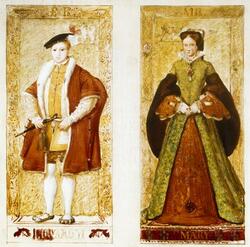
1585 – Birth of Thomas Howard, 14th Earl of Arundel, 4th Earl of Surrey, and 1st Earl of Norfolk




